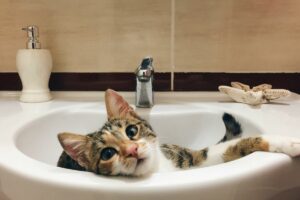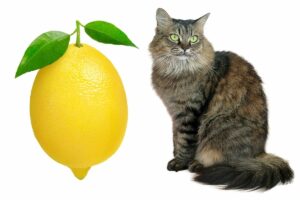Honeydew is a tasty and nutritious treat for us humans, but you may be wondering if you can share this fruit with your cats too.
Cats have very different dietary needs to us, but can cats have honeydew? Is it healthy for them too?

Surprisingly, yes! Cats can have honeydew and some cats even enjoy this melon treat.
Let’s find out more.
About Honeydew Melons
Honeydew melons are packed with vitamin C, B vitamins, Vitamin K and potassium, making them a great, healthy addition to our own diets – not to mention one of our 5 a day.
They’re also a really good source of fibre for humans.
These melons can range in colour from yellow or white to green or orange.
They are small to medium melons and they contain around 90% water, making them ideal for keeping you well hydrated.
They’re usually in season throughout the summer and sometimes into fall.
So, I Can Give My Cat Honeydew?
I actually didn’t know this before researching and writing this post, but yes, your cat really can eat honeydew melon.
And I imagine this would be a pretty refreshing treat in the hot summer months.
I’ve never tried it will my cats, but I definitely will now!
Honeydew isn’t at all toxic for cats making it safe for them to eat.
However, it’s not something that your cat needs to eat as it has no real nutritional value for your moggy.
That being said, due to the high water content that I mentioned earlier, it is possible that honeydew melon can help with dehydration in cats, but it’s really not a substitute for fresh drinking water – which should be available at all times.

Do Cats Even Like Honeydew?
Cats will be cats! Some are fussier than others.
If you’ve got a cat that is always desperate to eat whatever you’re eating, then they may well enjoy a bit of honeydew.
And, offering it as a cool, hydrating treat on a hot day might make your cat more likely to enjoy this fruit.
How to Feed Your Cat Honeydew
Remember that while is it safe to feed your cat honeydew melon, it’s not a food that is intended for cats and it’s not a necessary part of their diet.
Therefore, honeydew melon should be fed in moderation and only as a rare treat.
To prepare some honeydew melon for your cat, give it a wash and remove the skin and seeds.
Next, cut it into small, bite-sized pieces, or even consider mashing the melon.
Can Cats Eat Watermelon?
Yes, much like with honeydew, cats can also eat watermelon as long as it is seedless.
Again, this should only be given in small amounts.
Can Cats Eat Cantaloupe?
Cats can also safely eat cantaloupe, but follow the advise listed above for feeding honeydew if you’re giving your cat cantaloupe melon.
Interested to know if your cat can eat a lemon? Click here.

Making Sure Your Cat Has A Balanced Diet
While it’s okay to feed your cat small amounts of honeydew melon, or even watermelon or cantaloupe as a treat, please remember that these foods are not intended for cats and they don’t make up a necessary part of your feline’s diet.
To keep your cat healthy, focus on providing it with a healthy diet and plenty of clean water.
Treats should make up no more than 10% of your cat’s diet, and less if you are trying to manage your moggy’s weight.
Cats require a meat-based diet, so be sure you are feeding good quality wet or dry food.
Final Thoughts
So there you have it! As surprising as it may seem, cats can actually eat honeydew. And, in fact, many cats enjoy melon.
Just remember to feed treats like this to your cat in moderation and always be sure to maintain a good, healthy diet for your feline.
















